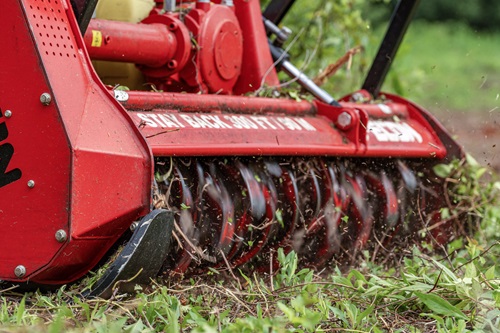
Choosing the right mulcher for your conditions might seem daunting
Fecon provides guidance to select a forestry mulcher considering all the different types of equipment. As a quick refresher, forestry mulchers are powerful machines designed to clear brush, trees, and other vegetation by grinding them into mulch. There are three main types of forestry mulchers: deck mulchers, disc mulchers, and drum mulchers:
- Deck mulchers: Deck mulchers utilize swinging blades to quickly and efficiently cut small vegetation. They excel in managing dense undergrowth, delivering a moderately fine finish. While they can cut larger material into sections, their strength lies in quickly clearing brush, making them an ideal choice for projects requiring speed and efficiency in processing lighter vegetation.
- Disc Mulchers: Disc mulchers utilize a spinning disc with fixed cutting teeth and operate quickly and efficiently. While they can fell larger trees, their primary function is rapid timber processing. They are unmatched in their ability to quickly process standing trees, making short work of material that other types might process more slowly. However, the trade-off for speed is a coarser finish.
- Drum Mulchers: Drum mulchers offer the most versatility, capable of processing both large and small material effectively. While they might not match the speed of a deck mulcher in clearing brush or a disc mulcher in processing standing timber, they excel at delivering a fine, even finish across various materials. This makes them a go-to choice for operators who need to handle a variety of tasks with a single attachment.
Each is suited for different tasks and terrains, so assess your specific needs first.
- Cutting and Processing Capacities, and Desired Finish: When choosing a forestry mulcher, understanding each type’s cutting and processing capacities is essential, as well as the desired finish you want to achieve. Each shine in different applications; sometimes, a combination of these is necessary to achieve optimal results. Deck mulchers are highly effective for rapidly clearing brush and smaller vegetation, delivering a medium finish. Disc mulchers are unrivalled in high-speed timber processing, excelling with standing trees but leaving a coarser finish. Drum mulchers provide the greatest versatility, handling both large and small materials while offering a fine, even finish across various conditions.
- Hydraulic Power and Efficiency: The performance of a forestry mulcher is heavily influenced by the hydraulic horsepower provided by the carrier machine. When selecting a mulcher, it’s crucial to ensure that the carrier offers sufficient hydraulic flow and pressure to match the mulcher’s specifications. Balancing hydraulic power with efficiency not only optimizes performance but also helps in reducing overall operating costs by maximizing productivity while minimizing fuel consumption.
- Durability and Maintenance: Durability is critical when it comes to land clearing. Choose mulchers made from high-quality materials designed for longevity. Also, make sure they’re easy to maintain. Look for machines with accessible parts and straightforward maintenance routines to minimize downtime and keep operations running smoothly.
- Safety Features: Safety cannot be overstated when it comes to heavy machinery. Choose mulchers with safety features like reinforced cabins, emergency shut-off switches, and protective guards to help prevent accidents and keep everyone safe.
- Compatibility: Compatibility is key! Make sure whichever mulcher you choose works with your current equipment, whether it’s an excavator, skid steer, or tractor, to ensure smooth integration and efficient operation
In the next issue of Logging-on, we will discuss how to select the correct mulcher. Source